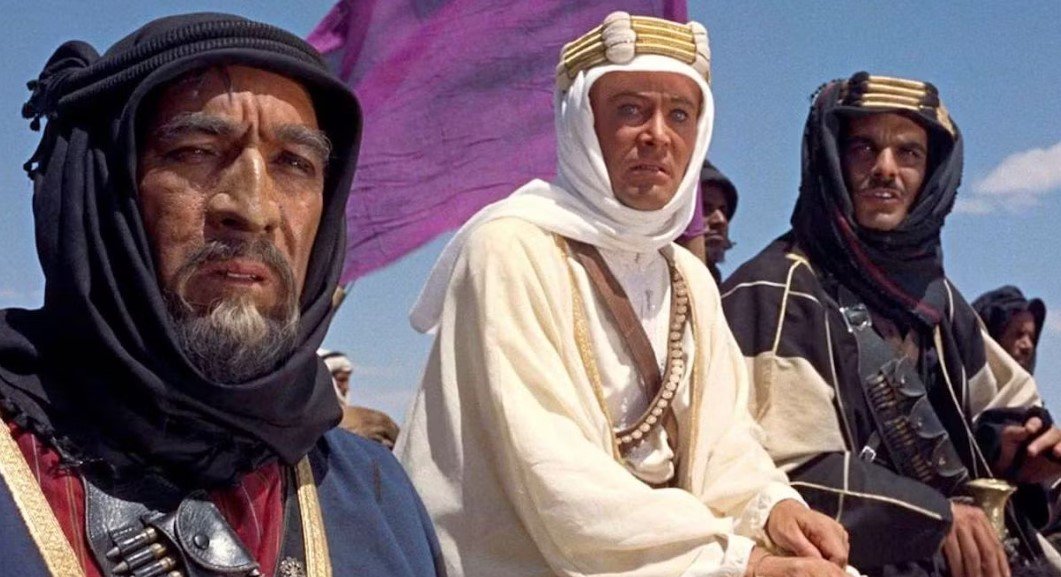David Lean’s sweeping desert epic earns universal acclaim six decades on, holding strong as a cinematic titan with a perfect 100% score on IMDb.
It runs for nearly four hours. It’s more than 60 years old. And yet, Lawrence of Arabia still manages to sweep modern viewers off their feet—and critics haven’t stopped praising it either. Now being called “the best UK film of all time,” this 222-minute historical masterpiece continues to dominate lists and rankings with a rare 100% score on IMDb.
Its epic storytelling, groundbreaking visuals, and unforgettable performances have transcended generations. There’s something magnetic about it. Something big. And yes, something very British.
A War Hero, a Desert, and a Story Told Like No Other
This isn’t just any biopic. Released in 1962, Lawrence of Arabia dives headfirst into the complicated, mythic life of T.E. Lawrence—a British officer whose World War I role in the Arab Revolt became the stuff of legend.
At the heart of the story is a rebellious officer with a deep understanding of the Bedouin tribes, risking everything in a brutal desert campaign against the Ottoman Turks. It’s dusty, dangerous, politically charged—and emotionally complex.
Only a few lines into the film, you’re not just watching Lawrence—you’re inside his struggle. It’s personal, and it hits hard.

The Faces Behind the Desert Mirage
Peter O’Toole’s performance as T.E. Lawrence wasn’t just a breakout—it was a revelation. His blue eyes blazing against miles of sand, he made an introverted, enigmatic soldier feel like both a hero and a mystery.
And he wasn’t alone. The supporting cast was an absolute powerhouse:
-
Alec Guinness as Prince Faisal
-
Omar Sharif as Sherif Ali
-
Anthony Quinn, Claude Rains, Jack Hawkins, and more
That’s a lot of star power. But the brilliance lies in how they never overshadowed the story. They melted into it. Every character, every nuance, every glance—it all added layers.
Awards Galore, Then and Now
When the Oscars rolled around, Lawrence of Arabia didn’t just show up—it conquered. It won seven Academy Awards, including:
-
Best Picture
-
Best Director (David Lean)
-
Best Cinematography
-
Best Art Direction
-
Best Film Editing
-
Best Sound
-
Best Original Score
Here’s a quick look at the major wins in a tidy table:
| Award Category | Winner |
|---|---|
| Best Picture | Lawrence of Arabia |
| Best Director | David Lean |
| Best Cinematography | Freddie Young |
| Best Art Direction | John Box & John Stoll |
| Best Editing | Anne V. Coates |
| Best Sound | John Cox |
| Best Original Score | Maurice Jarre |
The sheer scale of recognition was massive then—and now? The accolades keep coming. It’s on every film school syllabus. Ranked high in every critic’s list. And fan reviews? Still glowing.
Long But Worth Every Second
At 222 minutes (that’s 3 hours and 42 minutes, not counting intermission), the runtime is no joke. It’s not a popcorn flick or something you casually throw on in the background. You commit to it.
But audiences don’t seem to mind. Because this is cinema on a grand scale. Giant landscapes. Sweeping camera shots. Music that gives you chills.
One fan recently posted, “You don’t watch Lawrence. You live in it.”
British Roots With Global Impact
While it tells the story of a British military officer, Lawrence of Arabia isn’t just a UK story—it’s global. Filmed across Spain, Jordan, and Morocco, the scale of production was unheard of at the time.
Still, its Britishness remains at the core. Funded and produced primarily out of the UK, it represents a level of filmmaking ambition rarely seen today from British cinema.
The British Film Institute has repeatedly placed it near the top of its greatest film rankings. In 1999, it was named the third-greatest British film of the 20th century by the BFI. And in 2025, it seems to have taken the top spot in many circles.
A Perfect IMDb Score That Stuns Critics
Let’s be real—100% on IMDb? That’s almost mythical.
Yet Lawrence of Arabia manages to sit at the top, basking in the glow of a rare feat. The IMDb score, driven by thousands of reviews, reflects a near-universal admiration. That doesn’t happen without something truly timeless.
And it’s not just fans. Directors like Martin Scorsese, Steven Spielberg, and Christopher Nolan have all cited the film as a personal inspiration. Spielberg even called it “a miracle.”
What Makes It Stick After 60+ Years?
There’s no simple answer. But a few things definitely stand out:
-
The blend of sweeping adventure and intimate character study
-
A haunting score by Maurice Jarre
-
David Lean’s eye for epic composition—desert never looked so beautiful
-
Real emotional complexity beneath all the spectacle
And maybe, above all, it dares to ask: what does heroism even mean?
Still Playing, Still Stunning
Decades after its release, Lawrence of Arabia is still shown in select theaters around the world during special screenings. In fact, the 4K restoration released a few years ago brought an entirely new audience into its orbit—many seeing it for the first time on the big screen as intended.
People walked out of those screenings silent, overwhelmed. You don’t get that from just any film.








